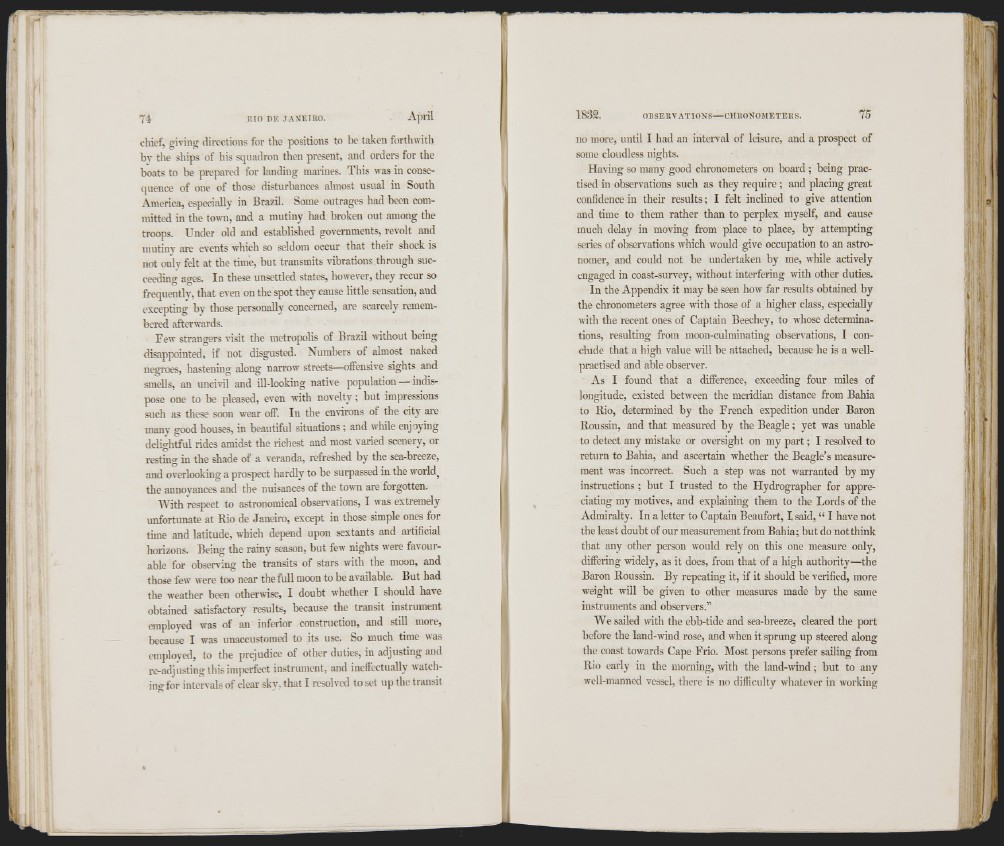
;i!
f
7 4 RIO DE JANEIRO, April
chief, giving directions for the positions to be taken forthwith
bv the ships of his squadron then present, and orders for the
boats to be prepared for landing marines. This was in consequence
of one of those disturbances almost usual in South
America, especially in Brazil. Some outrages had been committed
in the town, and a mutiny had broken out among tlie
troops. Under old and established governments, revolt and
mutinv are events which so seldom occur that their shock is
not only felt at the time, but transmits vibrations through succeeding
ages. In these unsettled states, however, they recur so
frequently, that even on the spot they cause little sensation, and
excepting bv those personally concerned, are scarcely remembered
afterwards.
Few strangers visit the metropolis of Brazil without being
disappointed, if not disgusted. Numbers of almost naked
negroes, hastening along narrow streets—offensive sights and
smells, an unchal and ill-looking native population — indispose
one to be pleased, even with novelty ; but impressions
such as tliese soon wear off. In the environs of the city are
many good houses, in beautiful situations ; and while enjoying
delightful rides amidst the richest and most varied scenery, or
restinçj in the shade of a veranda, refreshed by the sea-breeze,
and overlooking a prospect hardly to be surpassed in the world^
the annoyances and the nuisances of the town are forgotten.
With respect to astronomical observations, I was extremely
unfortunate at Rio de Janeiro, except in those simple ones for
time and latitude, which depend upon sextants and artificial
horizons. Being the rainy season, but few nights were favourable
for observing the transits of stars ivith the moon, and
those few were too near the full moon to be available. But had
the weather been otherwise, I doubt whether I should have
obtained satisfactory results, because the transit instrument
employed was of an inferior construction, and still more,
because I was unaccustomed to its use. So much time was
employed, to the prejudice of other duties, in adjusting and
re-adjusting this imperfect instrument, and ineficctmdly watch-
iiio- for intervals of clear sky, that I resolved to set up the transit
1832. OBSERVATIONS CHRONOMETERS. 75 M ¡t
I I
no more, until I had an interval of leisure, and a prospect of
some cloudless niglits.
Having so many good chronometers on board ; being practised
in observations such as they require ; and placing great
confidence in their results; I felt inclined to give attention
and time to them rather than to perplex myself, and cause
much delay in moving from place to place, by attempting
series of observations which would give occupation to an astronomer,
and could not be undertaken by me, while actively
engaged in coast-survey, without interfering with other duties.
In the Appendix it may be seen how far results obtained by
the chronometers agree with those of a higher class, especially
with the recent ones of Captain Beechey, to whose determinations,
resulting from moon-culminating observations, I conclude
that a high value will be attached, because he is a well-
practised and able observer.
As I found that a difference, exceeding four miles of
longitude, existed between the meridian distance from Bahia
to Rio, determined by the French expedition under Baron
Roussin, and that measured by the Beagle; yet was unable
to detect any mistake or oversight on my p a r t; I resolved to
return to Bahia, and ascertain whether the Beagle’s measurement
was incorrect. Such a step was not warranted by my
instructions ; but I trusted to the Hydrographer for appreciating
my motives, and explaining them to the Lords of the
Admiralty. In a letter to Captain Beaufort, I. said, “ I have not
the least doubt of our measurement from Bahia; hut do not think
that any other person would rely on this one measure only,
differing widely, as it does, from that of a high authority—the
Baron Roussin. By repeating it, if it should he verified, more
weight will be given to other measures made by the same
instruments and observers."
W e sailed ivith the ebb-tide and sea-breeze, cleared the port
before the land-wind rose, and when it sprung up steered along
the coast towards Cape Frio. Most persons prefer sailing from
Rio early in the morning, with the land-wind; but to any
well-manned vessel, there is no difficulty whatever in working
tf *i: